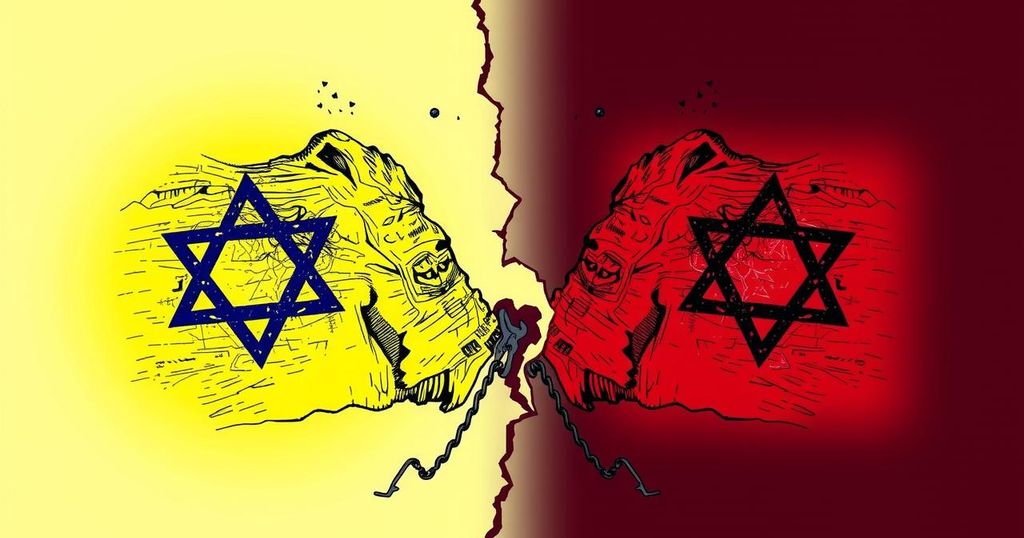Israel-Hezbollah Ceasefire Commences After Prolonged Conflict
A ceasefire between Israel and Hezbollah has commenced following over a year of conflict, starting at 04:00 local time. The agreement was brokered by the U.S., aiming for a permanent end to hostilities. Significant casualties were reported throughout the fighting, with over 3,800 deaths noted in Lebanon. Under the ceasefire terms, Israel will withdraw troops while Hezbollah will remove forces from southern Lebanon, facilitated by international oversight. Opinions in Israel are mixed as leaders express cautious optimism about long-term stability and security.
A ceasefire between Israel and Hezbollah has been officially initiated in Lebanon following over a year of intense conflict. This ceasefire began at 04:00 local time on Wednesday and aims to put a halt to the violent hostilities that have persisted for nearly 14 months. The agreement was announced by Israel in collaboration with France and the United States, as President Biden indicated its objective is a permanent cessation of hostilities.
In anticipation of the ceasefire, both parties engaged in attacks until the last moments, with Israel issuing evacuation orders for parts of Beirut just hours before the deadline. The Israel Defense Forces (IDF) urged residents in southern Lebanon to avoid approaching certain areas until it was deemed safe. Concurrently, reports indicated an exodus of individuals heading south soon after the commencement of the ceasefire.
The conflict, which intensified significantly following a series of Israeli bombardments in September, has been described as the deadliest in Lebanon in decades, resulting in over 3,823 fatalities as reported by local officials. As per the ceasefire agreement facilitated by U.S. brokered negotiations, Israeli troops are to withdraw from southern Lebanon within a 60-day timeframe, while Hezbollah’s presence in the region is also expected to diminish, eventually replaced by Lebanese government forces.
Lebanon’s Prime Minister Najib Mikati expressed his approval of the ceasefire, highlighting its potential to restore calm and stability, albeit emphasizing the necessity for Israel to comply with the stipulations of the deal. Conversely, Israeli Prime Minister Benjamin Netanyahu asserted that Israel would not hesitate to retaliate should Hezbollah breach the agreement, reiterating Israel’s right to self-defense under international law.
Public opinion regarding the ceasefire in Israel appears divided, with subsequent polls revealing that 37% of citizens are in favor, while 32% oppose the agreement. Netanyahu indicated that the cessation of fighting with Lebanon would allow Israel to concentrate its military efforts on the perceived threat posed by Iran. As the situation evolves, U.S. officials remain cautiously optimistic that this ceasefire may pave the way for renewed negotiations concerning the ongoing conflict in Gaza.
The Israeli-Hezbollah conflict has its roots in long-standing tensions between Israel and Iranian-supported militant groups in the region. Following extensive hostilities that began with Hezbollah’s rocket attacks post the Hamas assault on Israel, a humanitarian crisis ensued, leading to substantial casualties and mass displacement within Lebanon. The current ceasefire aims not only to provide immediate relief but also to establish a framework for future stability in the volatile region, with international powers seeking to stabilize the situation and pivot attention towards ongoing negotiations related to Gaza.
In summary, the recent ceasefire between Israel and Hezbollah marks a critical juncture in a protracted conflict characterized by significant devastation and loss of life. This agreement has been brokered with hopes of fostering a more permanent peace, while both parties remain on alert should violations occur. As this situation develops, the interplay of regional dynamics, particularly concerning Iran and the implications for other conflicts such as that in Gaza, will be closely monitored by international stakeholders.
Original Source: www.bbc.com




Post Comment